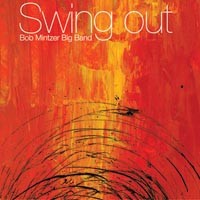Bob Mintzer Big Band
Swing Out
MCG Jazz
Portinho Trio
Vinho Do Porto
MCG Jazz
The Manchester Craftsmen's Guild hit the ground running with its MCG Jazz imprint, winning a Grammy for its first release in 1996. A few more awards and much notoriety have come since, allowing the label to continue its course of releasing albums by highly regarded musicians -- most recently, recordings by tenor saxophonist Bob Mintzer and one-named drummer Portinho.
Mintzer has his hand in several musical pies, the most popular probably being the contemporary Yellowjackets. While Mintzer also has a thorough knowledge of big-band music in all its forms, Swing Out, his third disc for MCG Jazz, doesn't steep itself in big-band music of the past.
The 16-piece group kicks off the title track with an advanced harmonic progression that places it in the 21st century and, as the title suggests, it does indeed swing. "Swangalang" continues the new vision, with a melody that evokes the Birth of the Cool work of Miles Davis, Gerry Mulligan and Gil Evans, and a blues structure that keeps changing shape. Kurt Elling, one of the higher-profile vocalists on the national jazz scene, adds vocals to a Pat Metheny tune. That tune might have been a little too ambitious an undertaking in the end, but it proves that Metheny and big band aren't mutually exclusive.
When the group tackles a standard, it's likely to get a facelift. "Someday My Prince Will Come," the Disney song long associated with Davis, gets an entirely new melody that bears little resemblance to the original, and still sounds thought-provoking. Along with the ensemble work, all arranged by Mintzer, Swing Out features strong solos from the leader, pianist Phil Markowitz and trumpeter Jim Rotondi.
Drummer Portinho came to the United States from Brazil in the 1970s, and has since racked up performance time with everyone from Harry Belafonte to Astrud Gilberto. He also has become one of those drummers who can drive a band with an extremely subtle approach to his kit. Vinho Do Porto features a piano trio, augmented by trombonist Jay Ashby of the Craftmen's Guild.
Even when the group plays a ballad, Portinho's skill reveals itself. On the gentle "Canção Que Morre No Ar," the drums sound like a simple click, even though they add dimension to the music. Wayne Shorter's classic "Footprints" gives everyone a chance to stretch out; Ashby adds additional percussion to a bubbling groove, which features walking bass courtesy of Itaiguara Brandão and a time signature that keeps reshaping itself.
But much of the time, Portinho's skill comes across in an understated manner, like "Dôce De Côco," where his accents fall on offbeats, so the downbeat isn't always felt but implied. Moments like this sound just as complex as the rapid title track -- which opens the disc with some fast 'bone work from Ashby -- and the equally boppish "Who's Smokin'?" at the other end of the disc. In between, the group salutes Brazil's foremost jazz composer, Antonio Carlos Jobim, in "Homage to Tom" (a reference to his nickname), a medley of three of the composer's songs. Pianist Klaus Mueller really comes to life here.
The only criticism of Vinho Do Porto is the length of the tunes: Half come in under four minutes, and the longest barely lasts six. A group like this shouldn't wrap up a song so soon. Then again, subtlety is key with this music.


















